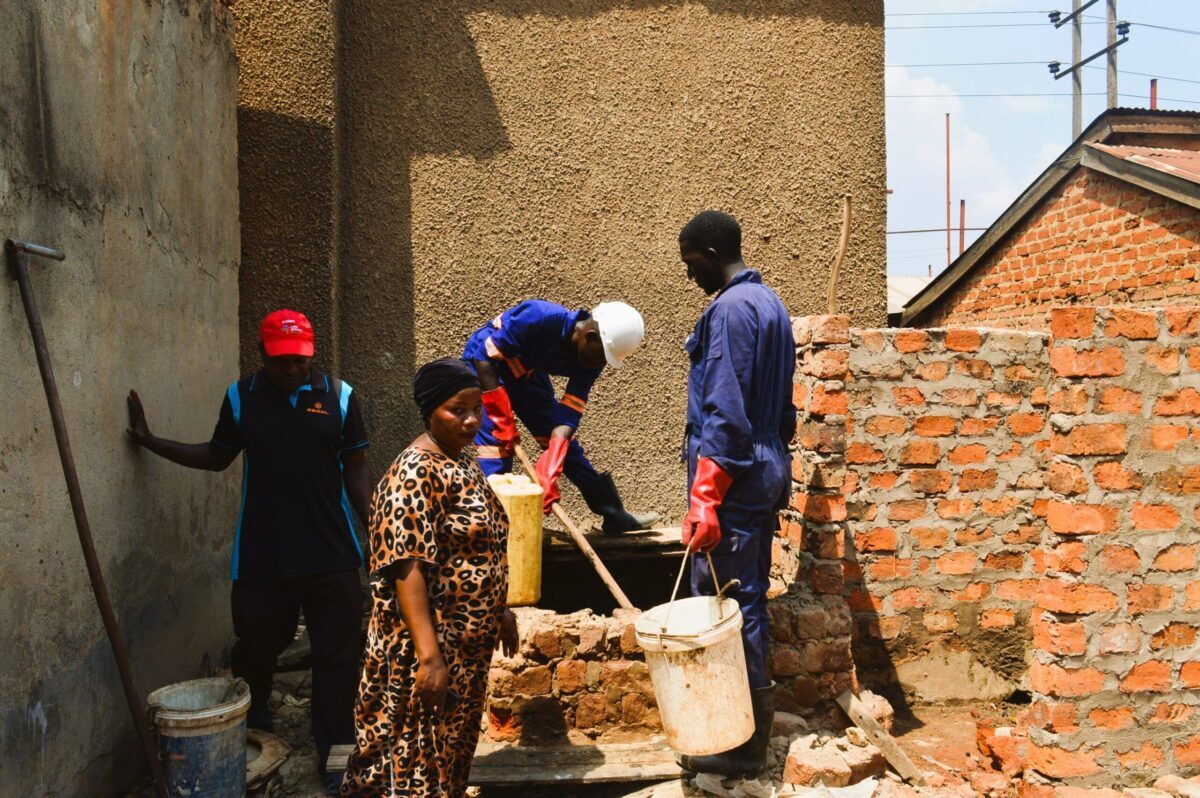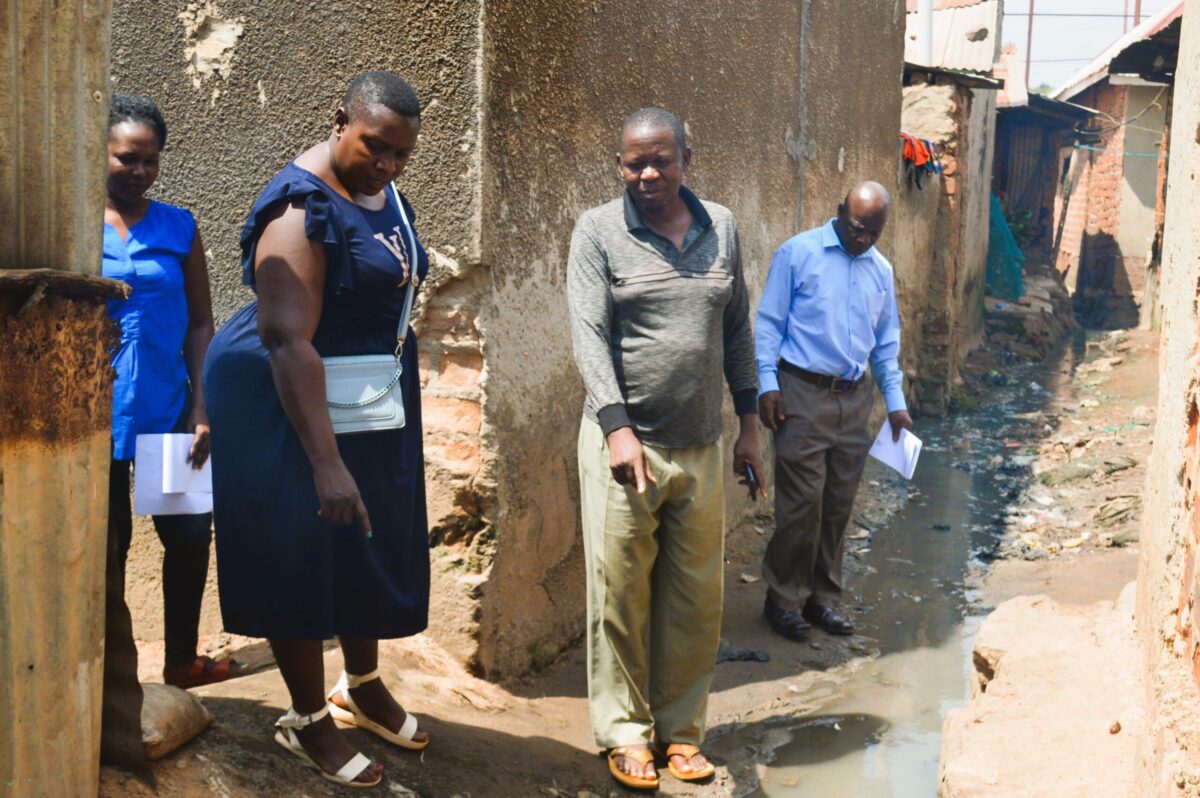 Stories
Stories
April 7, 2023 • 4 min read
Nakuya Aisha reaches into her pocket to answer a phone which has been ringing all morning. She directs the people on the other end of the call to meet her at a nearby petrol station in one hour. As a Village Health Team (VHT) member trained and supported by GOAL, this is a busy time for her.
“Those are our waste disposal service providers who are coming to empty a pit latrine in the neighbourhood,” she says as she dashes between makeshift buildings in the village of Sembule B, on the outskirts of the country’s capital, Kampala. The drainage pathway she steps over lines most paths in semi-urban settlements in the area.
Preventing Chronic Disease
Aisha is working to identify and liaise with service providers to safely dispose of the human waste in her community, which can easily cause outbreaks of disease in the area.
“We had multiple cholera outbreaks from 2016 to 2018 that even claimed the lives of five people. This was due to the fact that there was a lot of waste around here. Some residents would regularly dump waste in the drains. Others would release their waste whenever it rained. This ended up at our doorsteps and caused a lot of illness,” Aisha says.
The 36-year-old mother of five is part of a local Voluntary Health Team (VHT), who work with the community to improve families’ health outcomes. To address chronic illness that was plaguing the community, VHTs organised a number of meetings with community members, to discuss the poor hygiene and sanitation conditions, and how every household can take action.
This Community Led Action Approach (CLA) proved a success. Cholera outbreaks slowed down and people were living healthier lives. In late 2022, the VHTs were called on to once again respond to a new disease which put her community under serious risk.
A New Threat: Ebola
On 20th September 2022 by Uganda’s Ministry of Health, declared an outbreak of the southern variant of Ebola Virus Disease (EVD). By the time the epidemic was declared over in January, 56 people had tragically lost their lives. The number could have been higher but for the swift response from the Ugandan Ministry of Health, aid agencies and health workers.
GOAL, with experience as a key responder to the Ebola outbreak in Sierra Leone in 2014 and funding from Irish Aid, quickly responded. GOAL teams in Uganda trained community health workers on infection prevention and control (IPC) as well as case identification. They also trained them to deliver Ebola prevention messaging across their communities.
GOAL’s EVD response training was based on the SMART (Social Mobilisation Based on Research and Training) approach. The approach used a combination of Community Led Action (CLA) and mass media messaging to empower a community-centered response, which can be scaled up for operation on a national level.
Village Health Volunteers Combatting Ebola
Aisha is among the 32 VHTs who were trained by GOAL in the Rubaga and Makindye Divisions in Kampala. In total, 78 health workers in both Kampala city and neighbouring Kyegegwa District were trained to respond to EVD. Aisha was proud to respond to the devastating virus, and saw it as an opportunity for people to be reminded of the need for good hygiene and sanitation.

Aisha supervising the emptying of a latrine in Sembule B village by human waste disposal services.
“This training was very helpful because they woke us up, not just to Ebola, but ongoing risks that come with poor hygiene. We started seeing more people taking the hygiene more seriously again and doing the basics, like frequently washing their hands with soap. There was also collective participation in cleaning the drainage channels,” she says.
To enable widespread communication and awareness raising, GOAL also supported three radio talk shows conducted on EVD preparedness in Kyegegwa district. In Kampala, GOAL teams raised awareness of Ebola prevention through TV shows broadcast in the local language of Luganda.

Chairman of Sembule B village council, Tagoya Edmikes, accompanied by VHTs of Rubaga Division at a drainage channel in Sembule B village where residents used to divert fecal matter.
Adversity into Positive Change
According to the Chairman of Sembule B village council, Tagoya Edmikes, the CLA approach has empowered the council to create by-laws and policies on hygiene and sanitation in their community, preventing the spread of diseases like Ebola.
“GOAL’s methods, like body mapping, made things so simple and interesting for the community members and this triggered them into developing action plans not only to tackle issues around sanitation and hygiene but also around malnutrition,” says Tayoga.
Tayoga and Aisha’s work highlights how communities responding to Ebola in Uganda turned crisis and adversity into positive change for their community.
